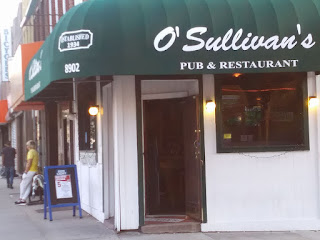To Him We Say, 'Well Done'

For all sad words of tongue and pen,
The saddest are these, 'It might have been.'
--John Greenleaf Whittier
I missed a big opportunity on Sunday and it’s still bothering me now, nearly a week a later.
No, it wasn’t a woman, not this time anyway. This was something more personal, if that’s possible.
I was riding on the N train to Manhattan when this elderly African-American couple got on board at Pacific Street.
I had to pull my leg out of the woman’s way so they could sit down next to me and for a second I thought she was giving me a dirty look.
My primal territorial alarm switched on and I started thinking who the hell she was giving me dirty looks when I realized how ridiculous I sounded even though no on could hear me.
I’m sorry to say so, but this is how my father often reacted to people, only he spoke up and usually pissed people off.
And I've put up with some many real slights and insults over the years because I was desperate to be liked, or I was trying to be a good sport--whatever that means--that I think now I've got a chip on my shoulder the size of a giant redwood.
I realized that this is not a good way to go through life, so I put my nose in the Sunday Times and forgot all about the elderly couple.
It wasn’t until I was getting off at Union Square that I noticed the man—the husband, I’ll assume—was wearing a cap reading “World War II Veteran.”
My father got me one of those caps years ago and I think—I hope—I still have it someplace around the house.
It’s fun to see people squint at the hat and that look at me to see if I actually old enough to have taken on the Nazis.
I felt like I should say something to this man. I wanted to tell him that my father also fought in World War II, ask him about his service, or if nothing else, just give a thumbs-up, acknowledging his time in the army.
The couple was also getting off at the same stop and I told myself, here, you’ve got a great opportunity to talk to him. But I said nothing.
They took a seat on one of the benches to wait for the local and while I had places to go, I wasn’t on any fixed schedule. I could have stood there and chatted with them for an hour if I felt like it. But I kept walking.
I stopped halfway up the stairs and looked back at them, I heard my mother’s voice in my head saying, “go talk to the man, go talk to the man,” like she did when I was a child to make me more out-going.
But I didn’t listen to that little voice. I turned and I walked out of the station and I regret it so much now.
I’m sure this man would have appreciated some acknowledgment of his days as a soldier. He is wearing the hat, for God’s sake. He must know people—normal people, that is—will ask him about it.
In a time when some many people can’t find Europe on a map, or have any knowledge of their country’s history, I’m certain this gentleman wouldn’t have minded a little recognition.
The Long Goodbye
This world has changed so much since he want to war and I wonder how he feels about the direction of country for which he risked his life.
And the fact that he was African American was important because I’ve never had the chance to talk to a black World War II vet. I would’ve gotten a different point of view on the war I’ve heard so much about when I was growing up.
There was so much I could have gotten, so much I could have learned from talking to that man. I could have told him about my father and maybe we could have swapped war stories, only I would have to retell my father’s stories.
He could have told me his whole story, about where he served, what he did after the war. I could have talked to this man all day if I wanted to, but I couldn’t bring myself to approach him.
It’s been a lifelong problem of mine, failing to go for things I want. God knows I still have enough trouble approaching women—at least when I’m sober.
What was there to fear of this man, though? Rejection? If he didn’t want to talk, I would have turned on my heel and walked out of the station, which was what I wound up doing anyway.
It’s funny how I’ve co-opted my father’s war experiences. There are times when I’ve felt such real hatred for the man, but no matter how angry I was, I could always get a crowd around me when I started repeating his war stories.
It’s the best of both worlds, I guess, war stories, without going to war.
I think of the troubles I had with my father, with the troubles I continue to have with him, even 18 months after his death.
We’ve often wondered if a lot of the problems he had might have stemmed from the war, even though no one said anything about PTSD back then.
I wish I had spoken to that man on the subway, but the only I can do is try to learn from my mistake and show that respect to that next veteran I meet.
Despite what you hear, old soldiers really do die and once they’re gone, it’s too late to salute them.



Comments